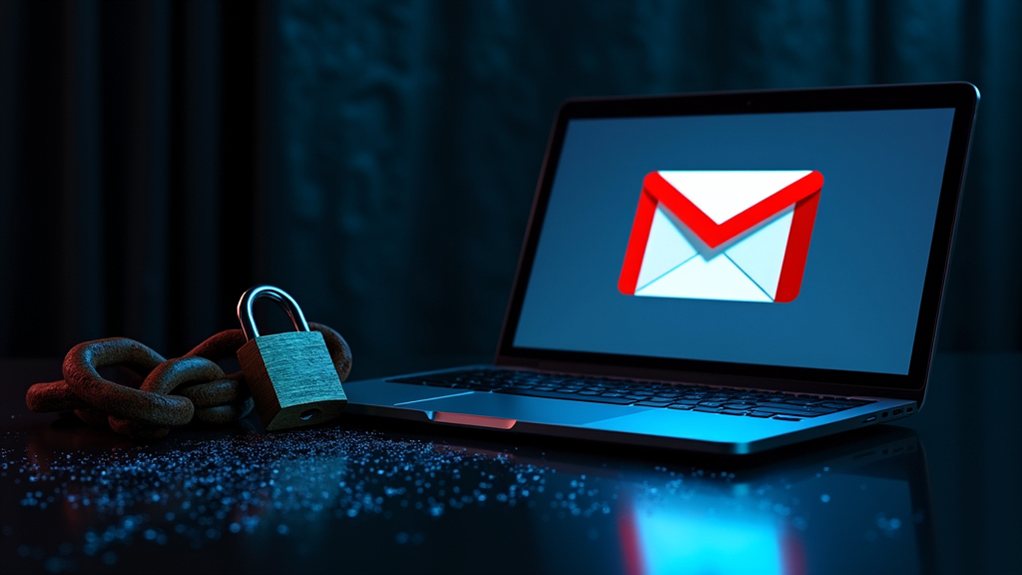Recent data reveals a staggering 24 billion passwords were exposed globally in 2022, with Gmail accounts becoming prime targets for cybercriminals. The 2025 Gmail security breach, which affected 2.5 billion users, highlighted how outdated password practices leave accounts vulnerable to AI-powered attacks. With 49% of data breaches linked to compromised passwords and 80% of users still following risky password habits, Gmail security demands immediate attention. These emerging threats signal the urgent need for stronger protection strategies.

Gmail’s security infrastructure faced its most significant test in 2025 when cybercriminals targeted over 2.5 billion users through a sophisticated Salesforce platform breach. Although no passwords were directly compromised, the incident exposed a troubling vulnerability: the wealth of stolen metadata facilitated unprecedented waves of AI-powered phishing attacks mimicking legitimate Google communications.
The breach served as a wake-up call for the staggering 80% of users who still rely on outdated password practices. Like a house with a state-of-the-art security system but a flimsy front door lock, even Gmail’s robust defences can’t fully protect accounts secured by weak passwords.
With users juggling an average of 100 online accounts, password fatigue has become the digital equivalent of leaving your keys under the doormat. The numbers paint a sobering picture: 49% of all data breaches trace back to compromised passwords, and 88% of successfully cracked passwords are 12 characters or fewer. The attackers, identified as ShinyHunters group, demonstrated their sophistication by impersonating IT support to gain unauthorized access. Users must remain vigilant as zero-day exploits increasingly target Gmail vulnerabilities.
In 2022 alone, cybercriminals exposed 24 billion passwords – enough to give every person on Earth three compromised credentials. Yet only 15% of users employ password managers, leaving the vast majority vulnerable to the ancient security sin of password reuse.
The rise of AI-powered threats has dramatically raised the stakes. Nearly half of all phishing attempts now leverage artificial intelligence to craft devastatingly convincing messages, analysing communication patterns to create perfectly tailored deceptions.
When combined with deepfake technology, these attacks can fool even security-conscious users into surrendering their credentials. The cascading nature of Gmail access makes strong password protection particularly important. A compromised Gmail account isn’t just about email – it’s potentially the keys to your digital kingdom, from Google Drive documents to saved passwords in Chrome to Google Pay transactions.
Corporate users face even greater risks, with 81% of business breaches stemming from password-related vulnerabilities. The solution isn’t complex, but it requires breaking old habits. Google strongly recommends implementing two-factor authentication alongside strong, unique passwords.
Think of it as adding a security guard to check IDs even after someone has the right key to enter. Password managers, although underutilised, offer a practical way to generate and maintain robust credentials without taxing human memory.
As AI-powered threats continue to evolve, the password remains both the first line of defence and potentially the weakest link in Gmail security. Users who maintain weak passwords aren’t just gambling with their email – they’re risking their entire Google ecosystem.
The 2025 Salesforce incident proved that even when Google’s walls hold strong, sophisticated attackers will exploit any vulnerability they can find, starting with the humble password.
Final Thoughts
With cyber threats evolving daily, it is crucial for Gmail users to prioritize their password security as a frontline defense. The Virus Removal Brisbane team can assist you in implementing essential security measures, such as two-factor authentication and unique complex passwords. By regularly updating your credentials, you can significantly reduce the risk of account breaches. Don’t wait until it’s too late—take proactive steps to secure your inbox. For assistance, click on our “Contact Us” page to get in touch with our experts today!
